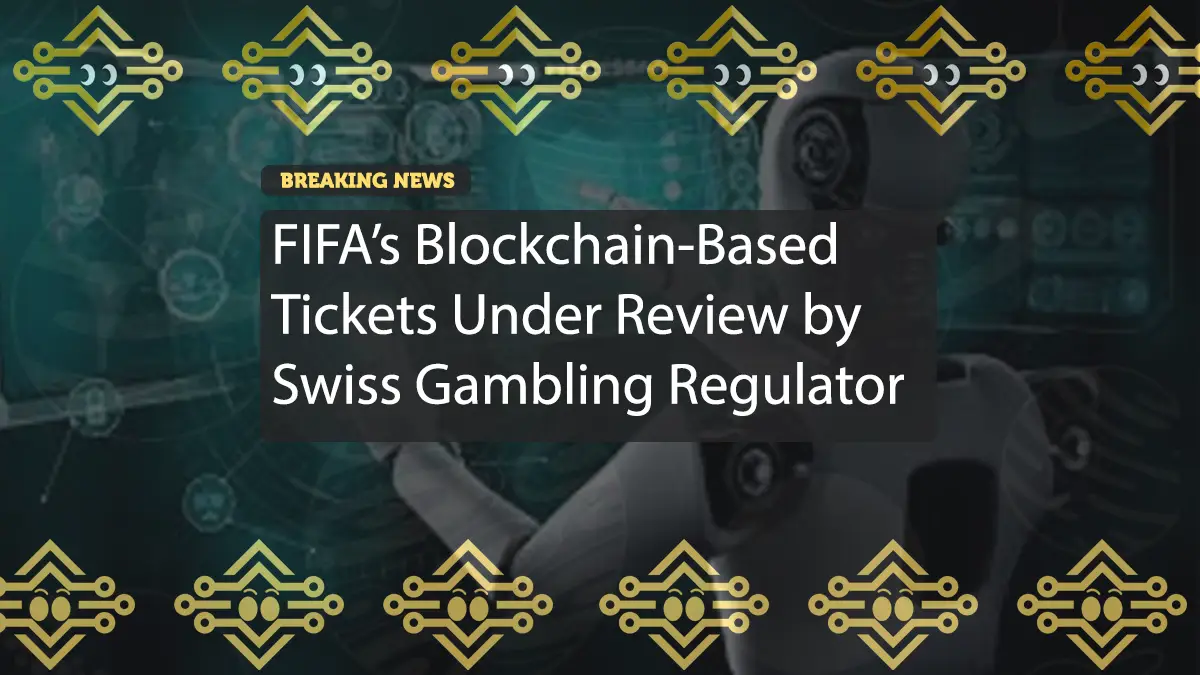
FIFA’s Blockchain-Based Tickets Under Review by Swiss Gambling Regulator
FIFA blockchain tickets are under the microscope as Switzerland’s gambling watchdog, the Swiss Federal Gaming Board (SFGB), launches a preliminary review into the governing body’s experimental “Right to Buy” NFT ticketing model. The move signals increasing caution around the intersection of digital collectibles, fan engagement, and gambling regulation — even as no violations have been alleged so far.
Why Switzerland’s Watchdog Is Paying Attention
The SFGB confirmed it’s assessing whether FIFA’s blockchain ticketing initiative — particularly its use of NFTs tied to World Cup and Club World Cup access — could fall under Switzerland’s gambling framework.
According to an official statement shared with Swiss Info, the board said,
“We are reviewing FIFA’s ‘Right to Buy’ NFT structure to determine if it involves any elements that would classify it under gambling law. At this stage, there are no indications of wrongdoing.”
The “Right to Buy” NFTs are part of a pilot system that allows fans to purchase or trade digital passes guaranteeing them access to buy official match tickets. Each NFT represents a unique blockchain token granting its holder priority purchase rights rather than direct admission.
While this structure aims to reduce scalping and improve fairness in ticket allocation, it also introduces speculative trading behavior, with users reselling NFTs for profit ahead of major tournaments.
How FIFA’s Blockchain Ticketing Works
FIFA partnered with blockchain infrastructure firm Algorand to mint digital “Right to Buy” tokens during the 2024 Club World Cup trials. The idea was to create a transparent, tamper-proof system where fan tickets could be authenticated and transferred easily, eliminating counterfeits.
However, critics argue that the secondary market activity — where NFTs are bought and sold at fluctuating prices — mirrors lottery-like dynamics. Some Swiss lawmakers have urged regulators to review whether such systems create “financialized fan experiences” that could breach national gambling laws.
An anonymous source close to the investigation told Crypto Valley Journal:
“The concern isn’t about FIFA per se, but whether digital collectibles tied to ticket rights create an unregulated form of speculation or gambling.”
No Accusations Yet — But the Stakes Are Rising
To date, no formal charges have been made, and FIFA has not been accused of misconduct.
A spokesperson for FIFA stated:
“Our blockchain ticketing program is compliant with all applicable regulations. The NFTs are utility-based and not intended as financial products.”
Still, the SFGB’s review underscores a wider European trend: as blockchain technology merges with entertainment and sports, regulators are increasingly cautious about blurring the lines between NFTs, gambling, and financial assets.
Earlier this year, France’s Autorité Nationale des Jeux (ANJ) issued similar guidance, noting that NFT-based rewards or lotteries could fall under gambling law if chance or speculation were involved.
Market and Industry Implications
FIFA’s experiment comes at a time when sports organizations are rapidly embracing blockchain tools to engage fans and manage ticketing logistics. From NBA Top Shot collectibles to UEFA’s digital passes, tokenized systems are reshaping fan engagement.
Yet, with growing global interest in sports NFTs, authorities are wary of speculative hype overshadowing legitimate innovation. If Switzerland determines that FIFA’s NFTs fit within gambling definitions, it could set a regulatory precedent for other nations evaluating similar fan-token projects.
“This could influence how Web3 sports platforms are designed moving forward,” said Jonas Meier, a Zurich-based crypto law expert. “Expect more emphasis on compliance and less on resale potential.”
What’s Next for FIFA and Blockchain Ticketing?
FIFA has maintained that its NFT ticket program remains an innovation project and that any global rollout would be contingent upon “regulatory clarity and partner collaboration.”
If the SFGB concludes that the NFTs do not constitute gambling, it may pave the way for FIFA to expand the program during future tournaments — potentially revolutionizing how digital ticket ownership and fan rewards are managed.
However, if regulators impose new restrictions, FIFA and other sports entities might need to restructure NFT mechanisms to ensure transparency and non-speculative utility.
Final Thoughts: Regulation Meets Innovation
The review of FIFA blockchain tickets highlights the growing friction between innovation and oversight. As more sports bodies explore NFTs to enhance engagement, regulatory frameworks must evolve to distinguish between legitimate fan tokens and speculative instruments.
For now, FIFA’s “Right to Buy” NFTs remain under observation — a reminder that in the new era of digital fandom, even innovation must play by the rules.
✅ Key Takeaways
- Swiss regulator reviews FIFA’s blockchain ticket NFTs for potential gambling classification.
- No wrongdoing has been alleged; the move is precautionary.
- FIFA maintains full compliance and transparency.
- The case may set a precedent for global NFT ticketing frameworks.
- Sports tokenization continues to grow, but regulatory clarity is crucial.
















